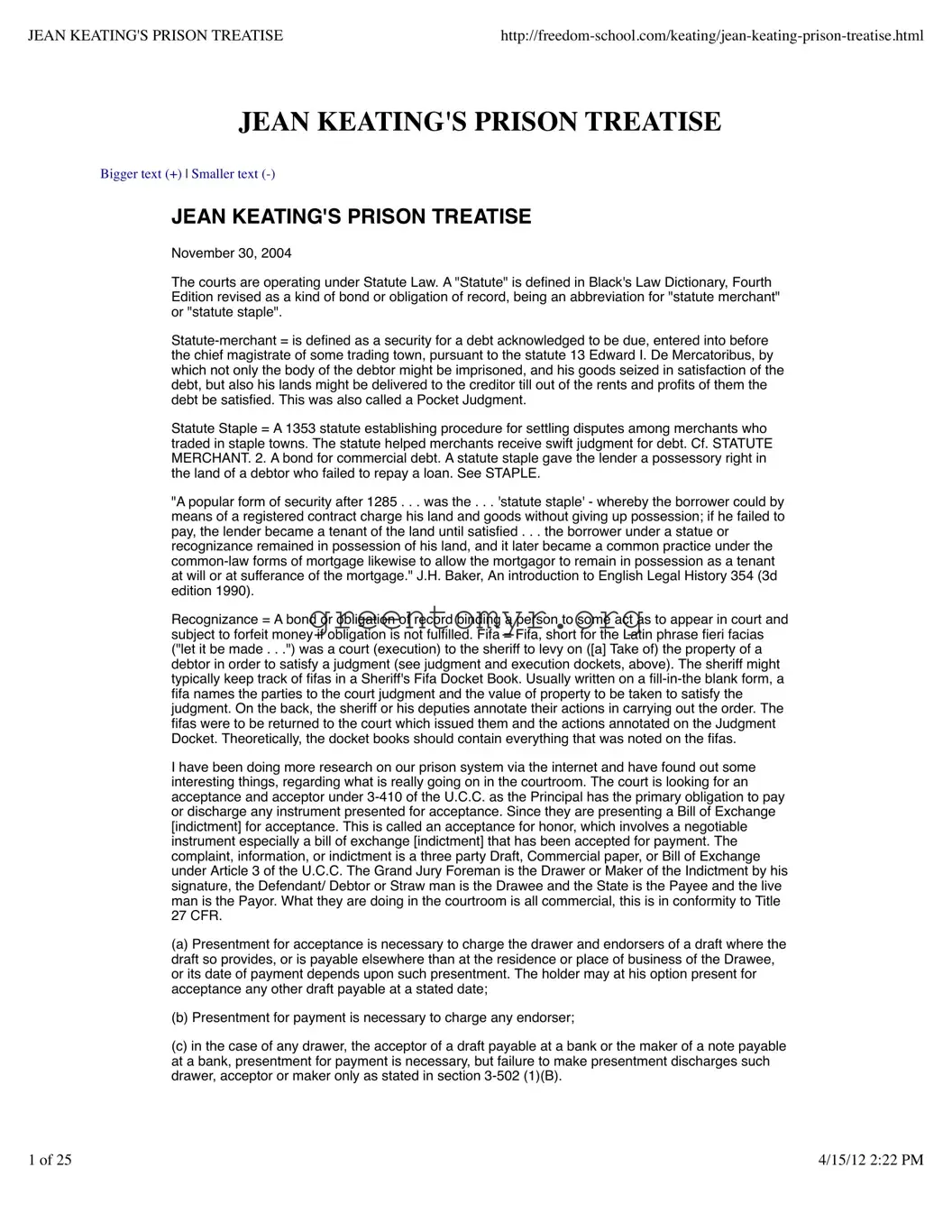"The selling point was simple: Private companies could build and run prisons cheaper that the governments. Unfettered American Capitalism would produce a better fetter, saving cash-strapped states millions of dollars each year" while simultaneously generating huge profits. The Nation explains how this miracle would be accomplished. "Private prisons receive a guaranteed [per diem] fee for each prisoner, regardless of the actual costs. Each dime they don't spend on food or medical care [for prisoners] or on wages and training for the guards is a dime they can pocket." Most guards in public prisons belong to the LEOU, which is part of the American Federation of State, County, and Municipal Employees AFSCME. I have a pointed question for you, why aren't we as principals on the Private side of the accounting cycle using our Exemption Priority to discharge all this Public Debt
By legal definition, all of your Federal and State "Statutes" are Bonds or Obligations of Record and are represented in the courtroom by the Recognizance Bond, which is a Bond of Record or Obligation for the payment of debt.
A condensed version of what is going on is that the CCA as a corporation, creates or issues stock certificates based on prison population, goods or chattel as they are called in commercial law. The underwriter is the one who buys the stock from the Issuer the CCA with intent to resell it to the public or an entity or person, which is usually an investment banker. The investment banker purchases all or part of the shares of the stock for resale to the public in the form of newly issued investment securities based on the shares of the stock. Brokerage Houses and Insurance Companies Bid on the Investment Securities with a Bid Bond issued by the GSA. The Bid Bond is then indemnified by a surety company through Performance and Payment Bonds. The Bid, Performance, and Payment Bonds are then underwritten by the Banks as Investment Securities for resale to the public. The Institutional Holders who own most of the Shares are:
1.FMR [Fidelity Management Research Corporation 3, 084,024 shares at a value of $109,791,254 dollars.
2.Legg Mason Inc. 1,235,563 shares valued at $43,986,042 dollars.
3.Barclays Bank Pic 1, 041,671 shares valued at $37,083,487.
There are seventeen more corporations owning various amounts of shares at varying dollar values. These can be viewed by going to http://finance.yahoo.com/q/mh?s=CXW.
The Top Insider Rule 144 Holders are:
1.Russell, Joseph V. / 64,450 shares as of 2-May-03
2.Ferguson, John D. / 40,340 shares as of 2-May-03
3.Quinlan, J. Michael / 28,575 shares as of 10-Sep-02
4.Turner, Jimmy / 13,817 shares as of 23-May-03
5.Horne, John R. / 5,751 shares as of 29-Jun-04
As you can see by the above information, this system permeates every fabric of our society. This treatise represents about 40 hours of brainstorming. Currently global terrorism is being funded by the prison system and the State's Retirement Fund go to www.DivestTerror.Org this is a 115 page treatise on the Terrorism Investments of the 50 States.
Go to a search engine and type in U.S Courts. Go to court links and click, which shows a map of the circuit courts, click on 7th circuit, a list of the 7th and 8th circuit courts will appear, click on Illinois Northern District Court, then click on Clerk's Office, then go to administrative services, then to Financial Department, you will see Criminal Justice Act, Post Judgment Interest Rates, and list of sureties, click on sureties it will take you to FMS.TREAS.GOV, there on left side you will see sureties listing, admitted reinsurers and forms, click on forms and you will see Reinsurance Agreement for a Miller Act Performance Bond SF 273, and a SF274 Payment Bond and a Reinsurance Agreement in Favor of the United States SF 275 and a list of Admitted Reinsurers, Pools and Associations, and Lloyds' Syndicates, you will also see a list of the Department of the Treasury's Listing of Approved Sureties [Department Circular 570].
U.S. District Courts are buying up the State Court default judgments, when you refuse to pay or dishonor the debt. Contractors and Insurance Companies are bidding on the default judgments with a Bid Bond, then a Reinsurance Company comes in and purchases a Performance Bond as a surety for the Bid Bond. The Performance Bond is then under written by a Payment Bond, this is usually done by an investment company or investment banker. When these Bonds are pooled they become mortgage backed securities or surety bonds. They are then put on the bond market through TBA [The
